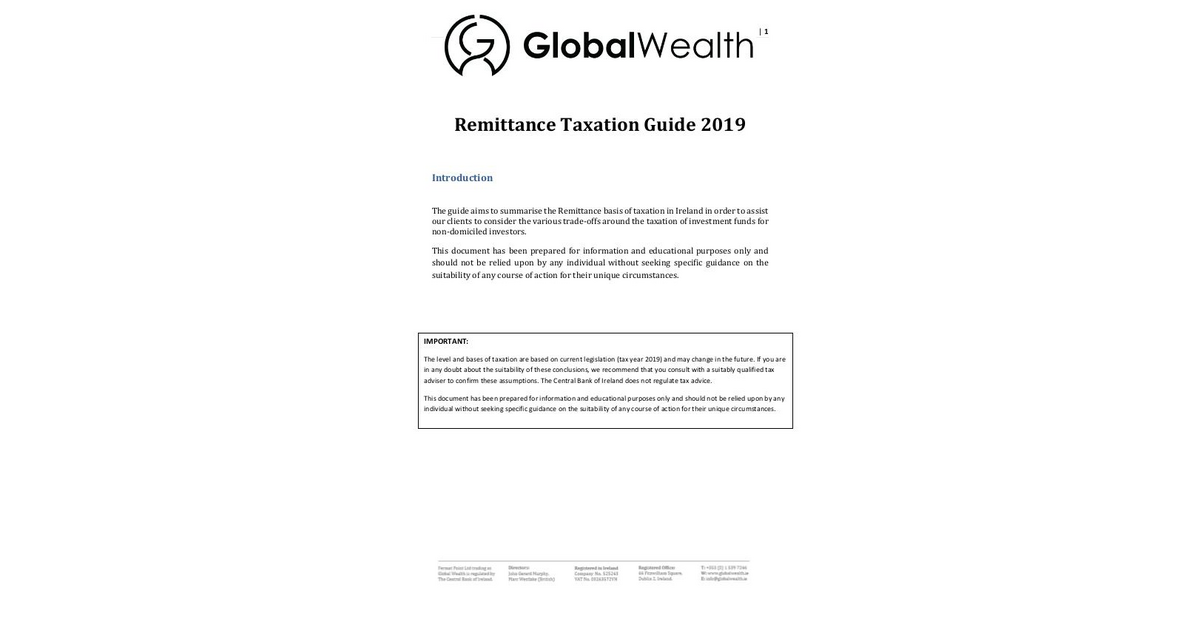I have spent the last 12 years on this subject and as a non/domiciled Irish resident myself can assure you that this subject is more complicated than it seems.
EVERY single client that has approached me has made avoidable mistakes due to a lack of appreciation of the issues and in particular Revenues anti-avoidance provisions.
Well-meaning advice from this site does not take account of all the issues and EVERY a post I have examined on the subject has some errors or omissions such that in my professional opinion will result in avoidable issues arising and errors being made with no protection in the form of professional indemnity insurance.
A detailed guide is available for purchase here
The guide aims to summarise the Remittance basis of taxation in Ireland in order to assist our clients to consider the various trade-offs around the taxation of investment funds for non-domiciled investors. This document has been prepared for information and educational purposes only and should...

joom.ag
The Three Big Questions Relating To Foreign Nationals
- Where do you call home?
- Where your assets are physically located?
- What are your intentions in the future?
Individuals have become more mobile over recent years. Irish individuals increasingly hold non-Irish investments, whether holiday homes, stocks and shares or other investment assets in Europe and further afield and, according to the last census, around 20% of the population of Ireland are Foreign Nationals.
How do we deal with financial planning for non-Irish assets, and how do we advise non-domiciled individuals living in Ireland?
The starting point is the fundamental principle of Irish private international law that the law of domicile (lex domicilii) of an individual determines the succession of moveable property whereas the law of the country where the property is situate (lex situs) determines the succession of immoveable property.
In other jurisdictions, particularly civil law countries, either the habitual residence or the nationality of the individual determines the succession of moveable property. In some jurisdictions, this factor also determines the succession of immoveable property.
This can give rise to complicated issues from a legal perspective.
Domicile
Domicile is a complex legal concept that is determined by reference to a person’s intention to permanently or indefinitely reside in a country together with their physical presence in that jurisdiction.
There is therefore a significant element of subjectivity, based on a person’s intentions. However, objective proof is sought in situations of doubt.
A number of factors which may assist in determining domicile are:
- Place of Birth
- Domicile of Parents
- Marital Status of Parents
- Any changes in parents’ domicile
- Declaration of domicile (for example statements in a will
- Execution of a Will under the laws of another territory
- Property owned by the taxpayer, and accommodation occupied by him or her on a regular basis. (it the accommodation permanent living accommodation or simply a holiday or occasional home?)
- What business connections does the taxpayer have with Ireland, or another territory?
- Where are the taxpayer’s closest personal, and social connections?
- How often does the taxpayer visit?
- Where do the taxpayer’s spouse and any children reside? Where are his extended family?
- How much time has the taxpayer spent in Ireland during the past 10 years?
- Has the taxpayer any plans to move permanently away from Ireland? What circumstances would trigger such a move?
- Has the taxpayer purchased a grave or made any burial arrangements?
A person may only have one domicile at any one time, although a domicile of origin can be displaced by a domicile of choice.
An individual will always be domiciled somewhere, even though it may be unclear exactly where that is.
There is no statutory test or definition of domicile, and it is purely a common law concept. An additional complication is the fact that the issue of domicile is not determined on universal rules. An Irish Court will determine a person’s domicile according to Irish law, while an English Court will determine the same issue based on English law. The result may not always be the same.
It is clearly important to seek advice prior to moving to Ireland
Please use the following link to
Book Time for an initial no obligation chat
Marc Westlake CFP
®, TEP, APFS, EFP ,QFA
CHARTERED, CERTIFIED & EUROPEAN FINANCIAL PLANNER™ professional
AND REGISTERED TRUST & ESTATE PRACTITIONER
Managing Director
[broken link removed]
Chartered Financial Planners
www.globalwealth.ie